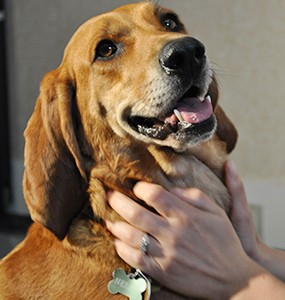Background
During the late 1700s Red Foxhounds were brought to America by Scottish immigrants where they were joined by Red Irish Foxhounds before the civil war. By the 18th century, coon hunters started breeding dogs that were fast, nimble, and had a keen sense of smell -- the Redbone Coonhound was born.
The Redbone Coonhound was recognized by the American Kennel Club in 2009.
Sizing up
- Weight: 45 to 80 lbs.
- Height: 21 to 27 inches
- Coat: Short, smooth and a little coarse
- Color: Red, with white on the chest in some cases
- Life expectancy: 10 to 12 years
What’s the Redbone Coonhound like?
The Redbone Coonhound is a very laidback dog. He loves his family to the point where he may suffer from separation anxiety. He will also get very sad and anxious if left alone for too long, so give him the love and attention he gives you.
Supervise him around smaller kids because he can get a little rowdy.
Known for being scent hounds, Redbones have a tendency to follow their nose wherever it takes them--i.e. across the street--so be careful if they’re outside and have them on leashes to avoid danger. They might also sniff out food in the kitchen or inside your fridge.
Early training is key for the Redbone, and you’ll need to start right away. Keep training sessions short and sweet or your Redbone might lose interest. Always use positive tones and food rewards when he’s done something right.
Grooming your Redbone Coonhound is a breeze with his short coat; all he’ll need is a quick brush through to keep it looking nice. Brushing will also help remove any dead hair.
Health
The Redbone Coonhound is generally a healthy breed but can develop hip dysplasia, progressive retinal atrophy, or ear infections.
Takeaway points
- The Redbone Coonhound would make an excellent hunting partner.
- The Redbone Coonhound is suitable for a home with older children.
- The Redbone Coonhound may not be the right dog for you if you work long hours.
- The Redbone Coonhound follows his nose, so make sure you follow him.
If you have any questions or concerns, you should always visit or call your veterinarian -- they are your best resource to ensure the health and well-being of your pets.
![]()
